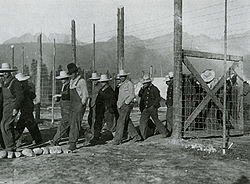
The Greening of Alberta's Tar Sands will result in a green glow of radiation.
So along with Greenhouse Gas emissions there will be more destruction of the Athabasca water basin when it is used to cool a nuke plant planned for the Tarsands.
Nuke plants require vast amounts of water as coolant, the result is hot water returned to mix with the original source water.
Henuset and Hank Swartout - founder and executive chairman of Precision Drilling Corporation - are co-directors of Energy Alberta Corporation. The new firm has an exclusivity agreement with Atomic Energy of Canada Limited to develop nuclear power in Alberta. Later this year in early 2008, AECL and Energy Alberta hope to file an application with the Alberta Energy & Utilities Board for a permit to construct a 750 megawatt generating plant.
The partnership estimates that a two-reactor nuclear plant over its 50-year lifetime would be 15% less expensive than its natural gas equivalent (including capital and decommissioning expenses as well as operating costs). Crucially important in Henuset's view, the long-term price of uranium to fuel those reactors is more likely to remain stable than natural gas. "Nuclear power is a natural hedge against rising gas prices," he states. His firm's nuclear-versus-gas cost projection assumes an Alberta gas price of $7.04 per gigajoule in the year 2015, which the former oilman considers highly conservative.
Energy Alberta is well aware that its project faces high hurdles. Because these power stations are large, big sums of money must be raised. In fact, nuclear power ranks as the most capital-intensive form of electricity generation, although its operating costs are correspondingly low. Time is another factor. The period required to win regulatory approval and construct a nuclear facility is estimated to be 10 years. Further, there are rival forms of power generation, notably coke and coal gasification (see accompanying article).
Perhaps most formidable of all, North Americans have lived inside a "no-nuke" bubble for several decades; hostility toward the technology among many people is deeply emotional as well as intellectual. In response, Henuset points out that uranium-fueled power continues to develop rapidly elsewhere in the industrialized world.
And the folks behind the push to go nuclear are none other than the Alberta PC party. The same folks who brought you the unplanned, unorganized, rapid expansion of the Tarsands. And though they ousted Ralph Klein for his failure to plan for the boom, they have elected Steady Eddie Stelmach in his place who promises more of the same.
David McColl: Why An Energy Economist Helped Oust Ralph Klein
A fair amount of technical and economic analysis of these issues has already been done by the Alberta Energy Research Institute, the Institute for Sustainable Energy, Environment and Economy and other organizations. McColl himself has researched and co-authored studies on the oilsands development, nuclear options and related subjects for the Canadian Energy Research Institute (CERI) and Energy Alberta Corporation.
What's still missing, the Calgary consultant maintains, is any meaningful political response. McColl, who holds a bachelor's degree from the University of Waterloo and a master's in economics from the University of Alberta, has been president of the Alberta Progressive Conservatives' youth wing for more than two years. From that post, he helped instigate the party leadership review which led to the ouster of Ralph Klein as the province's premier. "Many Albertans had a discouraging sense of public policy drift, even paralysis, at the Cabinet level," says the 26-year-old economist.
Also See:
Nuke The Tar Sands
Energy
CANDUPeak Oil
Tar Sands
Find blog posts, photos, events and more off-site about:
peak-oil, Tarsands, water, Pembina, Klein, oil, nukes, nuclear, gas, water, drought, Alberta, Canada,
AECL, candu, nuclear, nuclear-power, EnergyProbe, privatization, Conservatives, Flaherty, Munn, Government, Alberta, tarsands, nuke, nukes, power, energy,





